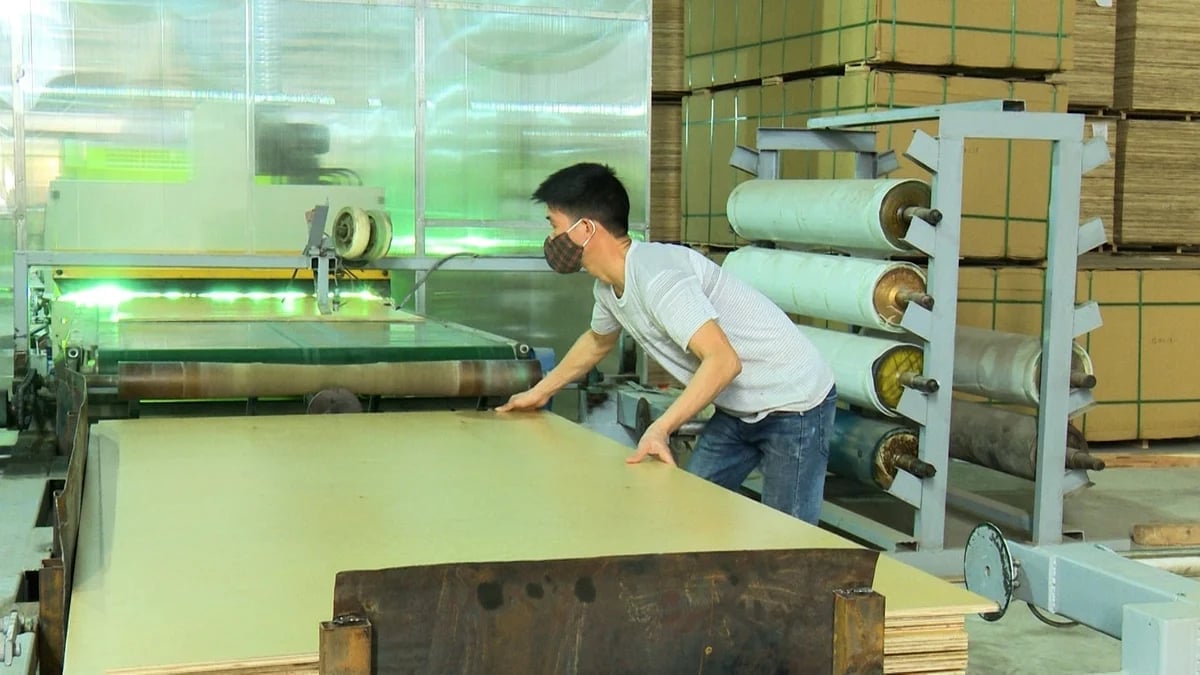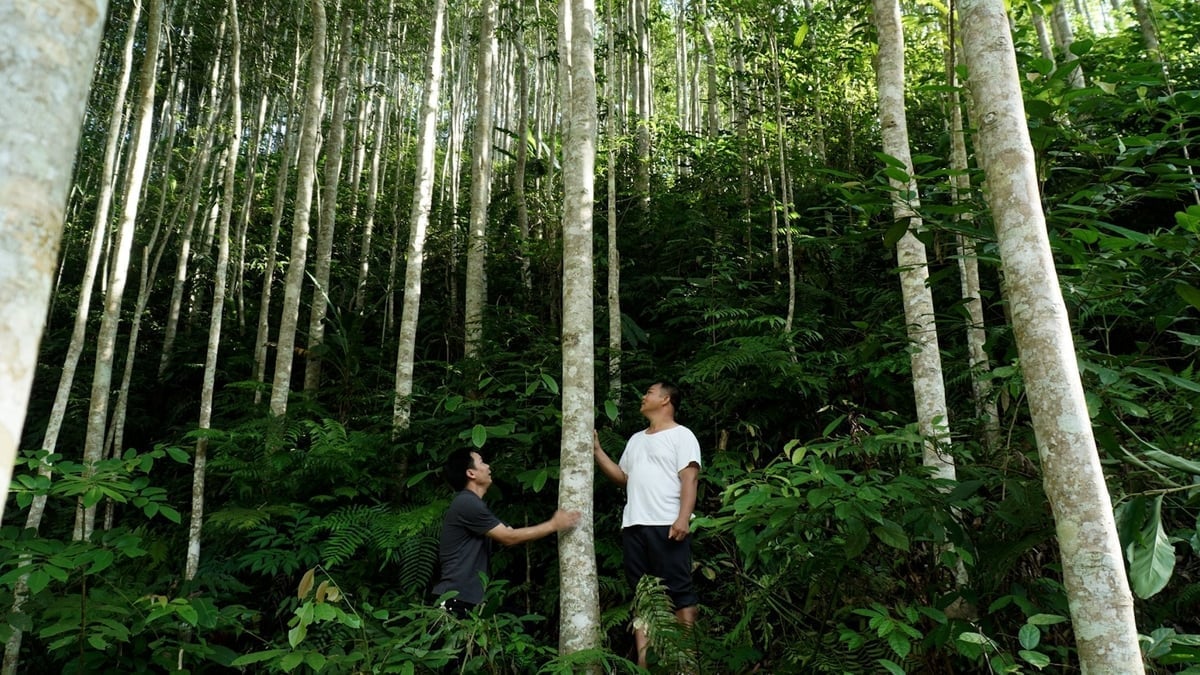December 21, 2025 | 14:26 GMT +7
December 21, 2025 | 14:26 GMT +7
Hotline: 0913.378.918
December 21, 2025 | 14:26 GMT +7
Hotline: 0913.378.918
On April 2, 2025, the U.S. government officially issued and implemented areciprocal tariff on certain products originating from Vietnam, with tax rates reaching up to 46%. On April 9, the U.S. government announced a 90-day suspension of its tariff plan for 75 trading partner countries that have not imposed retaliatory measures against the United States.
If the retaliatory tariff takes full effect after the 90-day period, it will place considerable pressure on the business community, potentially leading to reduced profits, fewer orders, and a decline in export market share, as U.S. partners may seek alternative sources from countries not subject to high tariffs.

Production of plywood and export flooring at Govina Investment Joint Stock Company. Photo: Ngoc Tu.
According to a report from the customs sector, in the first quarter of this year, the total import and export turnover of Bac Kan Province exceeded $10 million, an increase of over 8.1% compared to the same period last year, with export turnover reaching more than $6.8 million.
InBac Kan Province, there are 22 enterprises engaged in export activities, including two companies that export directly to the U.S. market: Govina Investment Joint Stock Company (exporting plywood) and Lechenwood Vietnam Co., Ltd. (exporting plywood and flooring). For Lechenwood Vietnam Co., Ltd. alone, exports to the U.S. market account for 54.7% of the company's total production output.
Immediately after the announcement of the new U.S. tariff policy, several export orders to the U.S. from two companies in Bac Kan Province were either suspended or cancelled. Specifically, Lechenwood Vietnam Co., Ltd. had 100% of its export orders for flooring cancelled.
In response to market fluctuations, the Department of Industry and Trade of Bac Kan Province forecasts that the province’s industrial growth rate may decline by 1%–2% compared to the projected growth scenario for 2025.
It is estimated that export turnover in 2025 for the wood industry may drop by $8–10 million. Some businesses may be forced to reduce their workforce, affecting social welfare, and as exports decline, state budget revenue from this sector is also expected to decrease.
To address these challenges, Bac Kan Province has organized a conference to assess the impact of the new retaliatory tariff policy from the U.S. on local businesses and to propose solutions to help overcome the difficulties.

Production difficulties faced by wood processing companies will directly affect the purchasing prices of raw wood from local people in Bac Kan Province. Photo: Ngoc Tu.
At the meeting, businesses with export products to the U.S. market proposed that the People’s Committee of Bac Kan Province consider supporting efforts to connect and expand into alternative markets and enhance trade promotion activities in regions such as the EU, Japan, South Korea, and Southeast Asian countries. The province is also expected to continue assisting businesses in accessing preferential loans to stabilize production, expand the domestic market, and implement appropriate tax deferral policies in line with current conditions.
Mr. Dinh Quang Tuyen, Standing Vice Chairman of the People’s Committee of Bac Kan Province, requested that relevant agencies develop support plans for affected businesses and intensify trade promotion efforts and market connection activities with alternative regions such as the EU, Japan, South Korea, and ASEAN. He also asked the Department of Finance and the State Bank to coordinate and review financial support channels to help businesses, especially those in the wood processing sector, stabilize production.
Mr. Tuyen emphasized that, under the current circumstances, the U.S. decision to temporarily suspend the tariff implementation for 90 days represents a “golden opportunity” for negotiations. Wood processing businesses in Bac Kan need to promptly adjust their business strategies, expand their markets, and enhance their adaptability to global trade fluctuations.
Wood-exporting businesses targeting the U.S. market need to proactively leverage free trade agreements to diversify their markets. The People’s Committee of Bac Kan Province will continue to petition the Government and relevant ministries and agencies to provide timely support measures for local enterprises in terms of legal, financial, and technical assistance.
Bac Kan is a province with a large area of planted forests—over 102,000 hectares—and the highest forest coverage rate in the country, exceeding 73%. In recent years, Bac Kan has attracted many wood processing businesses for export, with the U.S. market playing a particularly important role in the province’s wood product exports.
Translated by Hoang Duy

(VAN) The seafood industry is aiming for an export goal of USD 10.7 billion in 2025. However, resolving bottlenecks regarding data and green finance is an urgent requirement.

(VAN) Exports of ornamental fish generate nearly USD 15 million annually for Ho Chi Minh City, affirming the sector's position as a distinctive economic component of the city's modern urban agriculture structure.

(VAN) Lang Son agricultural products are upgrading planting-area standards, increasing deep processing, and expanding linkages to move toward sustainable exports.

(VAN) Despite numerous challenges, Vietnam's key seafood products are maintaining strong momentum, setting the stage for full-year exports to potentially reach USD 11 billion.

(VAN) The signing of a protocol between Viet Nam and China on the export of fresh jackfruit represents a significant milestone in agricultural trade cooperation between the two countries.

(VAN) On November 27, the Ninh Binh Department of Agriculture and Environment and the Institute for Green Growth Research organized a training course on greenhouse gas inventory for businesses.

(VAN) China’s cooking oil is suddenly flooding into India. It all comes down to a soybean surplus that Beijing doesn’t quite know what to do with.